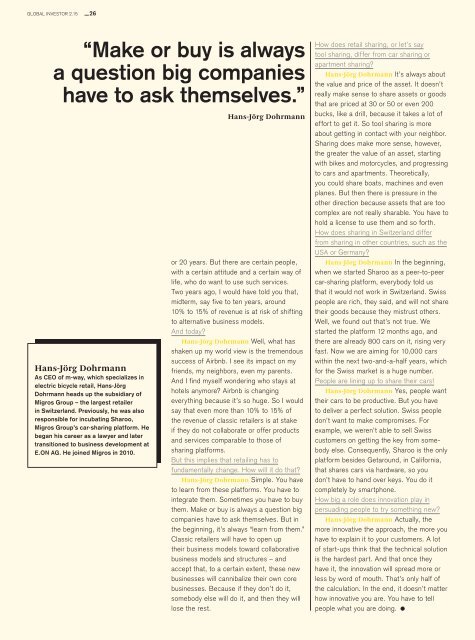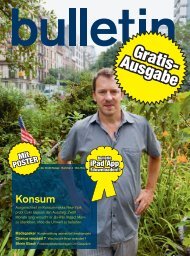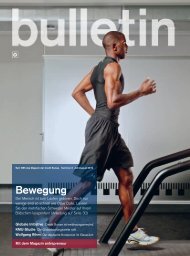The sharing economy
New opportunities, new questions Global Investor, 02/2015 Credit Suisse
New opportunities, new questions
Global Investor, 02/2015
Credit Suisse
Create successful ePaper yourself
Turn your PDF publications into a flip-book with our unique Google optimized e-Paper software.
GLOBAL INVESTOR 2.15 — 26<br />
“Make or buy is always<br />
a question big companies<br />
have to ask themselves.”<br />
Hans-Jörg Dohrmann<br />
As CEO of m-way, which specializes in<br />
electric bicycle retail, Hans-Jörg<br />
Dohrmann heads up the subsidiary of<br />
Migros Group – the largest retailer<br />
in Switzerland. Previously, he was also<br />
responsible for incubating Sharoo,<br />
Migros Group’s car-<strong>sharing</strong> platform. He<br />
began his career as a lawyer and later<br />
transitioned to business development at<br />
E.ON AG. He joined Migros in 2010.<br />
Hans-Jörg Dohrmann<br />
or 20 years. But there are certain people,<br />
with a certain attitude and a certain way of<br />
life, who do want to use such services.<br />
Two years ago, I would have told you that,<br />
midterm, say five to ten years, around<br />
10% to 15% of revenue is at risk of shifting<br />
to alternative business models.<br />
And today?<br />
Hans-Jörg Dohrmann Well, what has<br />
shaken up my world view is the tremendous<br />
success of Airbnb. I see its impact on my<br />
friends, my neighbors, even my parents.<br />
And I find myself wondering who stays at<br />
hotels anymore? Airbnb is changing<br />
everything because it’s so huge. So I would<br />
say that even more than 10% to 15% of<br />
the revenue of classic retailers is at stake<br />
if they do not collaborate or offer products<br />
and services comparable to those of<br />
<strong>sharing</strong> platforms.<br />
But this implies that retailing has to<br />
fundamentally change. How will it do that?<br />
Hans-Jörg Dohrmann Simple. You have<br />
to learn from these platforms. You have to<br />
integrate them. Sometimes you have to buy<br />
them. Make or buy is always a question big<br />
companies have to ask themselves. But in<br />
the beginning, it’s always “learn from them.”<br />
Classic retailers will have to open up<br />
their business models toward collaborative<br />
business models and structures – and<br />
accept that, to a certain extent, these new<br />
businesses will cannibalize their own core<br />
businesses. Because if they don’t do it,<br />
somebody else will do it, and then they will<br />
lose the rest.<br />
How does retail <strong>sharing</strong>, or let’s say<br />
tool <strong>sharing</strong>, differ from car <strong>sharing</strong> or<br />
apartment <strong>sharing</strong>?<br />
Hans-Jörg Dohrmann It’s always about<br />
the value and price of the asset. It doesn’t<br />
really make sense to share assets or goods<br />
that are priced at 30 or 50 or even 200<br />
bucks, like a drill, because it takes a lot of<br />
effort to get it. So tool <strong>sharing</strong> is more<br />
about getting in contact with your neighbor.<br />
Sharing does make more sense, however,<br />
the greater the value of an asset, starting<br />
with bikes and motorcycles, and progressing<br />
to cars and apartments. <strong>The</strong>oretically,<br />
you could share boats, machines and even<br />
planes. But then there is pressure in the<br />
other direction because assets that are too<br />
complex are not really sharable. You have to<br />
hold a license to use them and so forth.<br />
How does <strong>sharing</strong> in Switzerland differ<br />
from <strong>sharing</strong> in other countries, such as the<br />
USA or Germany?<br />
Hans-Jörg Dohrmann In the beginning,<br />
when we started Sharoo as a peer-to-peer<br />
car-<strong>sharing</strong> platform, everybody told us<br />
that it would not work in Switzerland. Swiss<br />
people are rich, they said, and will not share<br />
their goods because they mistrust others.<br />
Well, we found out that’s not true. We<br />
started the platform 12 months ago, and<br />
there are already 800 cars on it, rising very<br />
fast. Now we are aiming for 10,000 cars<br />
within the next two-and-a-half years, which<br />
for the Swiss market is a huge number.<br />
People are lining up to share their cars!<br />
Hans-Jörg Dohrmann Yes, people want<br />
their cars to be productive. But you have<br />
to deliver a perfect solution. Swiss people<br />
don’t want to make compromises. For<br />
example, we weren’t able to sell Swiss<br />
customers on getting the key from somebody<br />
else. Consequently, Sharoo is the only<br />
platform besides Getaround, in California,<br />
that shares cars via hardware, so you<br />
don’t have to hand over keys. You do it<br />
completely by smartphone.<br />
How big a role does innovation play in<br />
persuading people to try something new?<br />
Hans-Jörg Dohrmann Actually, the<br />
more innovative the approach, the more you<br />
have to explain it to your customers. A lot<br />
of start-ups think that the technical solution<br />
is the hardest part. And that once they<br />
have it, the innovation will spread more or<br />
less by word of mouth. That’s only half of<br />
the calculation. In the end, it doesn’t matter<br />
how innovative you are. You have to tell<br />
people what you are doing.

















